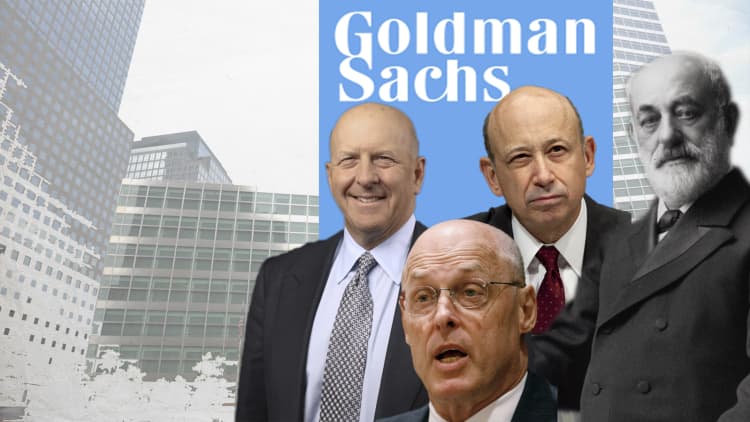Less than three years into its pivot to retail banking for the masses, Goldman Sachs CEO David Solomon still feels like an underdog.
The firm's Marcus business gathers $1 billion in deposits a month and recently announced its first credit card with Apple, but that progress has yet to be reflected in Goldman's stock, which trades at a discount compared with rivals. So when J.D. Power presented the firm with an award this week for customer satisfaction in personal loans, topping other big banks and fintech upstarts, Solomon soaked in the moment.
"We started out to try to create a business that would disrupt what's a big broad industry by really focusing on our customers, on our clients in a way that we would provide better service, better solutions, deal with pain points," Solomon told about 200 Marcus workers who gathered on the 26th floor of the firm's New York headquarters for a meeting attended by CNBC.
"Now, we're getting absolutely no credit from anybody else in the investing community about that yet," Solomon said.
"If we were out in Silicon Valley and made 20% of the progress that we've made, we would get a lot of credit and people would be throwing money at us to own a piece of this business," he added. "But nestled inside little old Goldman Sachs, we're just going to have to prove it over time."
In the post-financial crisis era, retail banking fueled by cheap deposits earns a far higher return than capital markets businesses, which is why Goldman is making this push. But Marcus sits within a company that still gets most of its revenue from Wall Street activities like trading and mergers advice, and the trading businesses in particular have been exposed to an industrywide decline. Goldman shares have fallen 19% in the past year.
Despite the investor indifference, Goldman's Marcus business is at an inflection point. Begun in late 2016, it has essentially two products: high-interest savings and personal loans. The bank has gathered about $48 billion in deposits and made $5 billion in loans so far, but new offerings are coming.
Next up is the Apple Card, and after that, a digital wealth management service for the mass affluent, executives have said. At some point, the personal finance app Goldman bought last year, Clarity Money, will join the Marcus brand. Ultimately, the bank could offer the full spectrum of retail finance products, either directly or through partnerships, from checking accounts to mortgages and insurance.
Goldman doesn't yet disclose much about Marcus, which is part of its investing and lending division, including how much revenue it generates.
'Vampire squid'
The fact that consumers surveyed by J.D. Power gave Goldman high marks for a financial product underscores the weirdness of the bank's move to Main Street. For nearly all of its 150 years, Goldman courted the rich and powerful, from heads of state to CEOs and hedge fund managers.
To the extent that the public was aware of Goldman Sachs, it was mostly from negative headlines about questionable institutional deals during the financial crisis, leading Rolling Stone to label the bank a "vampire squid" whose purpose was to extract money from humanity.
Now, through Marcus, the bank is looking to help average Americans save a few dollars here and there.
"In the history of our firm there are different periods of time where we all go through different cycles and different things happen," Solomon said in an interview Tuesday after the J.D. Power event. "I believe there are a lot of people in the world who aspire to be affiliated with our brand, and if we offer a service to them that's more focused on what they need, over time we'll have plenty of customers."
Goldman's threats to disrupt the other big banks have brought skepticism. The rest of the card industry is watching the rollout of the Apple Card after Citigroup pulled out of talks amid doubts it could earn an acceptable profit on the partnership, CNBC reported last month.
By all appearances, Goldman's Marcus offerings seem to be as advertised: no fees, simple disclosures and streamlined applications.
Digital deals
The bank created its products after surveying 100,000 potential customers, according to Harit Talwar, who runs Goldman's global consumer finance operations. By starting a new business from scratch, he claims that they can offer personalization others can't, like loans with nonstandard durations and automated payment deferrals for people impacted by natural disasters.
The bank's online savings account currently pays a 2.25% interest rate, far higher than accounts from big U.S. banks with extensive branch networks. And its personal loans are often used to pay off credit cards with interest rates that are 3% to 5% higher than Marcus, Talwar said.
In its latest incarnation, Goldman appears to have figured out that rather than being pure altruism, the new fintech ethos of zero fees and pricing transparency is actually an advanced form of self-interest.
"Our promise is that in everything we do, we help customers save money," Talwar said in a recent interview. "We are not doing it as a not-for-profit motive or something. We are doing it because we think it helps us win."



